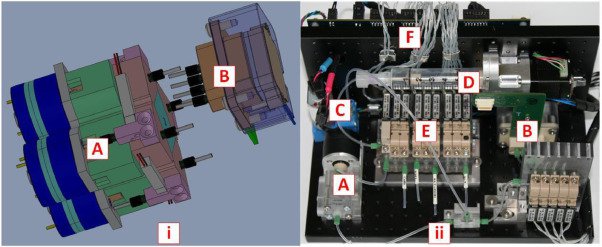
July 16, 2019
Research Highlight
A New Prototype for Studying Gene Expression in Space
GEMM (Gene Expression Measurement Module)

A 3D computer aided design of the nanosatellite version of GEMM (i) and prototype breadboard of GEMM (ii). The main components of GEMM are labeled. This includes sample preparation module (A), the hybridization chamber (B), the vacuum pump (C), the syringe pump (D), reagent distribution manifold (E), and electronics control board (F) in a 1U footprint.Image credit: Peyvan et al. (2019).
Astrobiologists have developed a prototype for a miniaturized and automated instrument that is capable of measuring gene expression, and would be suitable for deployment on uncrewed space missions, including small satellites.
Without the aid of human scientists, the GEMM (Gene Expression Measurement Module) is able to break open cell walls, extract and purify the RNA that is released, analyze the RNA with a microarray, and provide an electrochemical readout of the results. All of this is performed by the instrument, which can fit into a space of only 76 mm × 76 mm × 100 mm (roughly 3 inch x 3 inch x 4 inch). This is small enough for the cargo space on a nanosatellite. Because of its portability, GEMM could also prove useful for research in the field here on Earth.
The team behind GEMM have published the design of the instrument as well as the results of validation testing. The results show that, although GEMM is small in size, the instrument provides measurements that are comparable in accuracy to laboratory results.
The study, “Gene Expression Measurement Module (GEMM) for Space Application: Design and Validation,” was published in the journal Life Sciences in Space Research. The work was supported by NASA Astrobiology through the Exobiology Program.